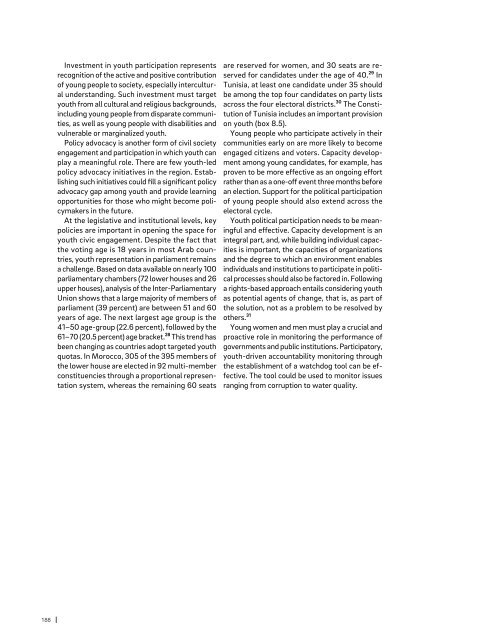Arab Human Development Report 2016
z6bSXU
z6bSXU
You also want an ePaper? Increase the reach of your titles
YUMPU automatically turns print PDFs into web optimized ePapers that Google loves.
Investment in youth participation represents<br />
recognition of the active and positive contribution<br />
of young people to society, especially intercultural<br />
understanding. Such investment must target<br />
youth from all cultural and religious backgrounds,<br />
including young people from disparate communities,<br />
as well as young people with disabilities and<br />
vulnerable or marginalized youth.<br />
Policy advocacy is another form of civil society<br />
engagement and participation in which youth can<br />
play a meaningful role. There are few youth-led<br />
policy advocacy initiatives in the region. Establishing<br />
such initiatives could fill a significant policy<br />
advocacy gap among youth and provide learning<br />
opportunities for those who might become policymakers<br />
in the future.<br />
At the legislative and institutional levels, key<br />
policies are important in opening the space for<br />
youth civic engagement. Despite the fact that<br />
the voting age is 18 years in most <strong>Arab</strong> countries,<br />
youth representation in parliament remains<br />
a challenge. Based on data available on nearly 100<br />
parliamentary chambers (72 lower houses and 26<br />
upper houses), analysis of the Inter-Parliamentary<br />
Union shows that a large majority of members of<br />
parliament (39 percent) are between 51 and 60<br />
years of age. The next largest age group is the<br />
41–50 age-group (22.6 percent), followed by the<br />
61–70 (20.5 percent) age bracket. 28 This trend has<br />
been changing as countries adopt targeted youth<br />
quotas. In Morocco, 305 of the 395 members of<br />
the lower house are elected in 92 multi-member<br />
constituencies through a proportional representation<br />
system, whereas the remaining 60 seats<br />
are reserved for women, and 30 seats are reserved<br />
for candidates under the age of 40. 29 In<br />
Tunisia, at least one candidate under 35 should<br />
be among the top four candidates on party lists<br />
across the four electoral districts. 30 The Constitution<br />
of Tunisia includes an important provision<br />
on youth (box 8.5).<br />
Young people who participate actively in their<br />
communities early on are more likely to become<br />
engaged citizens and voters. Capacity development<br />
among young candidates, for example, has<br />
proven to be more effective as an ongoing effort<br />
rather than as a one-off event three months before<br />
an election. Support for the political participation<br />
of young people should also extend across the<br />
electoral cycle.<br />
Youth political participation needs to be meaningful<br />
and effective. Capacity development is an<br />
integral part, and, while building individual capacities<br />
is important, the capacities of organizations<br />
and the degree to which an environment enables<br />
individuals and institutions to participate in political<br />
processes should also be factored in. Following<br />
a rights-based approach entails considering youth<br />
as potential agents of change, that is, as part of<br />
the solution, not as a problem to be resolved by<br />
others. 31<br />
Young women and men must play a crucial and<br />
proactive role in monitoring the performance of<br />
governments and public institutions. Participatory,<br />
youth-driven accountability monitoring through<br />
the establishment of a watchdog tool can be effective.<br />
The tool could be used to monitor issues<br />
ranging from corruption to water quality.<br />
188


